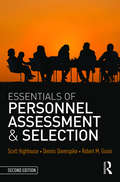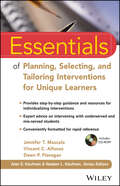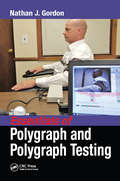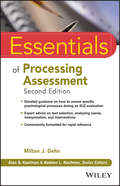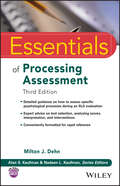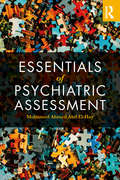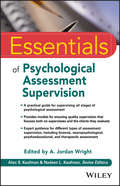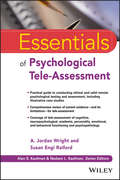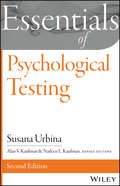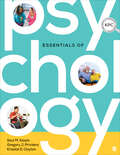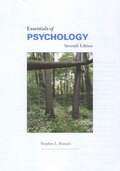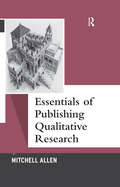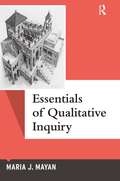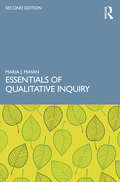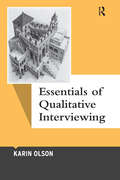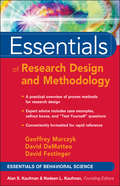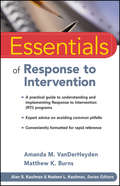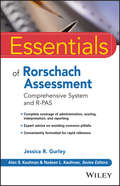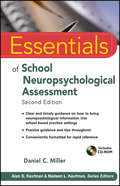- Table View
- List View
Essentials of Personnel Assessment and Selection
by Scott Highhouse Robert M Guion Dennis DoverspikeThis second edition provides managers and students the nuts and bolts of assessment processes and selection techniques. With this knowledge, managers learn to make informed personnel decisions based on the results of tests and assessments. The book emphasizes that employee performance predictions require well-formed hypotheses about personal characteristics that may be related to valued behavior at work. It also stresses the need for developing a theory of the attribute one hypothesizes as a predictor--a thought process too often missing from work on selection procedures. Topics such as team-member selection, situational judgment tests, nontraditional tests, individual assessment, and testing for diversity are explored. The book covers both basic and advanced concepts in personnel selection in a straightforward, readable style intended to be used in both undergraduate and graduate courses in Personnel Selection and Assessment.
Essentials of Planning, Selecting, and Tailoring Interventions for Unique Learners
by Dawn P. Flanagan Vincent C. Alfonso Jennifer T. MascoloA Resource for Designing and Implementing Intervention Programs for At-Risk Learners This authoritative resource provides step-by-step procedures for planning, selecting, and tailoring interventions for at-risk learners with a unique focus on how to individualize interventions using actual case examples. In addition, this volume offers guidelines for gathering and interpreting data in a manner that assists in identifying targets for intervention and rich discussion and information relating to specific academic, cognitive, and behavioral manifestations of students with learning difficulties in reading, math, writing, and oral language. Practitioners will also recognize and learn how to intervene with students from underserved and mis-served populations who are at risk for learning failure including English-language learners and students from impoverished environments. Each chapter describes how specific difficulties interfere with classroom tasks and explain how to select, modify, or otherwise tailor an intervention based on that information. As with all volumes in the Essentials of Psychological Assessment series, this volume includes callout boxes highlighting key concepts, extensive illustrative material, and test questions. The companion CD-ROM provides additional worksheets, case studies, and handouts.
Essentials of Polygraph and Polygraph Testing
by Nathan J. GordonThroughout history, there has been an intrinsic need for humans to detect deception in other humans. Developed in 1923, the polygraph machine was a tool designed to do just this. To date, there have been many improvements made to the basic polygraph instrument. This book outlines the instrumentation as well as the latest in questioning techniques and methods available to the professional interviewer to determine truth from deception. The book covers psychology and physiology, a history of polygraph with the advances of leading figures, question formulation, data analysis, legal implications and legal cases, and the author’s developed technique Integrated Zone Comparison Technique (IZCT).
Essentials of Processing Assessment
by Milton J. DehnStep-by-step guidance and the latest research findings on the basics of processing assessment Now in its Second Edition, Essentials of Processing Assessment provides critical information about this important aspect of cognitive functioning. This practical resource provides students and practitioners with the tools they need to accurately and efficiently assess an individual's ability to process information. As part of the Essentials of Psychological Assessment series, this book provides information mental health professionals need to practice knowledgeably, efficiently, and ethically in today's behavioral healthcare environment. Includes illustrative material, callout boxes highlighting key concepts, and "test yourself" question for gauging and reinforcing learning Update throughout to include four new chapters and a new companion CD-ROM that includes all worksheets and testing charts Packed with indispensable guidelines on organizing a processing assessment and interpreting results Essentials of Processing Assessment, Second Edition, offers the best one-stop source of information to help students and practitioners identify processing strengths and weaknesses and plan appropriate interventions.
Essentials of Processing Assessment, 3rd Edition (Essentials of Psychological Assessment)
by Milton J. DehnA critical handbook for practitioners and clinicians engaged in processing assessments In the newly revised third edition of Essentials of Processing Assessment, a team of distinguished practitioners delivers an expert framework for planning, conducting, and interpreting an assessment of psychological processes. Emphasizing a pattern-of-strengths-and-weaknesses (PSW) perspective, the book offers an overview of evidence-based interventions for various psychological processes. In the book, readers will review cognitive processing theories, apply a PSW model for specific learning disability (SLD) identifications, review the relationships between psychological processes and specific kinds of achievement, and detailed information on how to assess 14 different processes covered in the model. Readers will also find: Step-by-step guidelines and worksheets that walk readers through the analysis and interpretation of test results Strategies for identifying students with specific learning disabilities Information about major cognitive and memory scales, as well as scales designed for processing assessmentAn essential handbook for psychologists and other practitioners and clinicians engaged in processing assessments of children and adults, Essentials of Processing Assessment, 3rd Edition will earn a place in the libraries of anyone seeking to make more accurate diagnoses and identify more effective treatments.
Essentials of Psychiatric Assessment
by Mohamed Ahmed Abd El-HayA psychiatric assessment is a structured clinical conversation, complemented by observation and mental state examination, and supplemented by a physical examination and the interview of family members when appropriate. After the initial interview, the clinician should be able to establish whether the individual has a mental health problem or not, the nature of the problem, and a plan for the most suitable treatment. Essentials of Psychiatric Assessment provides the resident or beginning psychiatrist with a complete road map to a thorough clinical evaluation.
Essentials of Psychiatric Diagnosis, Revised Edition: Responding to the Challenge of DSM-5®
by Allen FrancesGrounded in author Allen Frances's extensive clinical experience, this comprehensive yet concise guide helps the busy clinician find the right psychiatric diagnosis and avoid the many pitfalls that lead to errors. Covering every disorder routinely encountered in clinical practice, Frances provides the ICD-9-CM codes and (where feasible) ICD-10-CM codes required for billing, a useful screening question, a colorful descriptive prototype, lucid diagnostic tips, and a discussion of other disorders that must be ruled out. The book closes with an index of the most common presenting symptoms, listing possible diagnoses that must be considered for each. Frances was instrumental in the development of past editions of the DSM and provides helpful cautions on questionable aspects of DSM-5. The revised edition features ICD-10-CM codes where feasible throughout the chapters, plus a Crosswalk to ICD-10-CM codes in the Appendix. The Appendix, links to further coding resources, and periodic updates can also be accessed at the companion website.
Essentials of Psychiatric Nursing
by Mary Ann Boyd Rebecca LuebbertHelp beginning nursing students gain the basic knowledge, therapeutic communication capabilities, and patient interaction skills to confidently prepare for psychiatric nursing practice. Easy to use and backed by the latest clinical evidence, Essentials of Psychiatric Nursing, 3rd Edition, is rich with clinical examples and explanations that help clarify challenging concepts and equip students for success as entry-level nurses. Whether used in dedicated psychiatric nursing courses or for integrating psychiatric nursing principles into an existing course, this engaging text establishes the fundamental understanding students need to effectively care for individuals with emotional and mental health problems in any healthcare setting. New and Updated Features NEW! Content helps students recognize and address the effects of COVID-19 on mental health and embrace changes in the practice and delivery of mental health nursing, such as virtual therapy. UPDATED! Coverage of veteran care empowers students to confidently manage specific mental health issues affecting military veterans and their families. UPDATED! Community nursing care coverage helps students make a confident transition to practice outside of traditional hospital settings, increasing their career prospects.
Essentials of Psychological Assessment Supervision (Essentials of Psychological Assessment)
by A. Jordan WrightThe only pocket-size reference on supervising psychological testing and assessment In 2014, the American Psychological Association (APA) adopted a set of guidelines for clinical supervision for health service psychology. While technically covered by these guidelines, supervising clinical psychological assessment includes additional tasks (such as ensuring accurate administration, scoring, and interpretation of tests) and tensions. Supervisors must often instruct supervisees on the data-integration process—which can involve more direct teaching than standard clinical supervision—while encompassing the same interpersonal, therapeutic, and less structured guiding aspects as psychotherapy supervision. It is increasingly common to view clinical supervision in the assessment process and supervision of psychotherapy as two significantly different tasks. Surprisingly, there is very little training and guidance available on appropriate, effective, and beneficial methods of psychological assessment supervision. Essentials of Psychological Assessment Supervision seeks to remedy the lack of literature in this area, offering guidance on supervising psychological testing and assessment. This much-needed guide provides supervisors with authoritative, up-to-date information on guidelines relevant to assessment supervision. Additionally, detailed coverage of supervision of cognitive, personality/emotional, psychoeducational, neuropsychological, forensic, and therapeutic assessments, among others, provide supervisors with guidance and structure in the supervision process. Focusing on practical application, this book offers guidance on topics such as assessment models appropriate in different areas of assessment; diversity issues; evaluation and feedback of supervisee performance; and ethical, legal, and regulatory considerations relevant in each assessment context. An invaluable resource for practitioners, this book: Offers practical advice on supervising a wide range of clinical psychological assessments Includes contributions from experts in their respective subfields Provides guidance on incorporating new American Psychological Association (APA) and Society for Personality Assessment (SPA) guidelines into the supervision process Fills an urgent need for an up-to-date reference on assessment supervision Essentials of Psychological Assessment Supervision is a must-have reference for both psychology practitioners who supervise the assessment process and instructors of psychological testing and assessment.
Essentials of Psychological Tele-Assessment (Essentials of Psychological Assessment)
by A. Jordan Wright Susan Engi RaifordDiscover a comprehensive and practical guide to the use of tele-assessments in psychological testing from two leading voices in psychology. Essentials of Psychological Tele-Assessment delivers a primer on the current state of professional knowledge related to psychological tele-assessment, ranging from the ethical and empirical considerations to the practical applications of tele-assessment procedures. The overarching framework encourages the balancing of the limitations of the current state of the research literature with the very real needs for assessment services to continue, even when in-person procedures are not feasible. This book includes discussion on a broad range of tests and measures, with information related to both the state of the empirical support for tele-tests and measures, with information related to both the state of the empirical support for tele-assessment utilizing them and the practical 'how-to' for administering, scoring and interpreting daa that emerge from them. Additionally, frameworks for integrating the data that emerge from tele-assessment procedures are discussed. The book is applicable to those transitioning to tele-assessment practice and those training in a wide variety of training programs. Readers will also benefit from the inclusion of: - Practical checklists and information about specific tests must be adapted to the realities of the tele-health environment. - Information about how the resutls of tests should be interpreted differently to account for the tele-health environment. -Case examples and studies to illustrate many of the challenges of working in tele-assessment -Guidance on how to balance the limitations of the state of the empirical literature on the validity of tele-assessment with the real-world needs of clients. Perfect for psychologists and trainees in a variety of health services, including clinical, counseling, school and forensic psychology, Essentials of Psychological Tele-Assessment will also earn a place in the libraries of anyone utilizing or training in cognitive, developmental, neuropsychological, psychoanalytic, psychodynamic, and interpersonal models of psychological assessment.
Essentials of Psychological Testing (Essentials of Behavioral Science #4)
by Susana UrbinaAn easy-to-understand overview of the key concepts of psychological testing Fully updated and revised, the second edition of Essentials of Psychological Testing surveys the basic principles of psychometrics, succinctly presents the information needed to understand and evaluate tests, and introduces readers to the major contemporary reference works in the field. This engaging, practical overview of the most relevant psychometric concepts and techniques provides the foundation necessary for advanced study in the field of psychological assessment. Each clear, well-organized chapter includes new examples and references, featuring callout boxes highlighting key concepts, bulleted points, and extensive illustrative material, as well as “Test Yourself” questions that help gauge and reinforce readers’ grasp of the information covered. The author’s extensive experience and deep understanding of the concepts presented are evident throughout the book, particularly when readers are reminded that tests are tools and that, like all tools, they have limitations. Starting with a basic introduction to psychological tests, their historical development, and their uses, the book also covers the statistical procedures most frequently used in testing, the frames of reference for score interpretation, reliability, validity and test item considerations, as well as the latest guidelines for test selection, administration, scoring and reporting test results. Whether as an orientation for those new to the field, a refresher for those already acquainted with it, or as reference for seasoned clinicians, this book is an invaluable resource. SUSANA URBINA, PHD, is Professor Emeritus of Psychology at the University of North Florida, where she taught courses in psychological testing and assessment. A Diplomate of the American Board of Assessment Psychology and a licensed psychologist, Dr. Urbina practiced in the field of psychological assessment for over a decade. She coauthored the seventh edition of Psychological Testing with Anne Anastasi and has published numerous articles and reviews in the area of psychological testing.
Essentials of Psychology
by Saul Kassin Gregory J. Privitera Krisstal D. ClaytonPsychology exists all around us. It influences politics, policy, social interactions, teaching and learning science, and even workplace practices. In Essentials of Psychology, authors Saul Kassin, Gregory J. Privitera, and Krisstal D. Clayton propel students into a clear, vibrant understanding of psychological science with an integrative, learn-by-doing approach. Students assume the role of a psychologist, carrying out experiments; and making predictions. Compelling storytelling, real-life examples, and the authors’ active practice approach encourages critical thinking and engagement. This title is accompanied by a complete teaching and learning package, including: Digital Option / Courseware SAGE Vantage is an intuitive digital platform that delivers this text’s content and course materials in a learning experience that offers auto-graded assignments and interactive multimedia tools, all carefully designed to ignite student engagement and drive critical thinking. Built with you and your students in mind, it offers simple course set-up and enables students to better prepare for class.
Essentials of Psychology
by Saul Kassin Gregory J. Privitera Krisstal D. ClaytonPsychology exists all around us. It influences politics, policy, social interactions, teaching and learning science, and even workplace practices. In Essentials of Psychology, authors Saul Kassin, Gregory J. Privitera, and Krisstal D. Clayton propel students into a clear, vibrant understanding of psychological science with an integrative, learn-by-doing approach. Students assume the role of a psychologist, carrying out experiments; and making predictions. Compelling storytelling, real-life examples, and the authors’ active practice approach encourages critical thinking and engagement. This title is accompanied by a complete teaching and learning package, including: Digital Option / Courseware SAGE Vantage is an intuitive digital platform that delivers this text’s content and course materials in a learning experience that offers auto-graded assignments and interactive multimedia tools, all carefully designed to ignite student engagement and drive critical thinking. Built with you and your students in mind, it offers simple course set-up and enables students to better prepare for class.
Essentials of Psychology
by Stephen L. FranzoiEssentials of Psychology encourages students to analyze the scientific journey of discovery in psychology. The text also facilitates a personal journey of discovery and includes more than 20 Self-Discovery questionnaires that ask how the specific text material relates to students’ lives.
Essentials of Psychology Fifth Edition
by Stephen L. FranzoiPsychology involves the "study of the mind." As such, introductory psychology offers you the hope that course material will help you better understand not only other people but also yourself. Seeking such knowledge is a distinguishing feature of young adulthood, and the college experience is specifically designed to foster this quest.
Essentials of Psychology: Concepts and Applications (Fourth Edition)
by Jeffrey S. NevidThe new edition of this brief introductory text retains the hallmark features that have made its parent text unique, while offering a more manageable, student-friendly format. The book was written with three goals in mind: to make the study of psychology accessible and engaging to the beginning student in psychology, to provide students with a solid grounding in the knowledge base in psychology, and to help students succeed in the course. Nevid’s comprehensive learning system-derived from research on memory, learning, and textbook pedagogy-is featured throughout. This learning model incorporates what the author calls the Four E’s of Effective Learning-Engaging Student Interest, Encoding Information, Elaborating Meaning, and Evaluating Progress. ESSENTIALS OF PSYCHOLOGY: CONCEPTS AND APPLICATIONS, 4th Edition, provides a broad view of psychology as well as applications of the knowledge gained from contemporary research to the problems and challenges we face in today’s world.
Essentials of Publishing Qualitative Research (Qualitative Essentials #12)
by Mitchell AllenGetting a qualitative article or book published involves more than simply doing the research, writing it up, and sending it off. You also need to know how to navigate the social relations of presenting your work to the journal editor or book publisher—and how to craft your message to them—if you want to be successful. Written by a highly-respected publisher of qualitative research, this brief, practical resource shows you how to identify the right home for your work. It also guides you through the publications process-- from crafting the abstract to writing, production, and marketing--once you’ve found the best publisher. The author -demystifies what publishers and journal editors do, how they make their decisions on qualitative articles, research studies, and methods books;-discusses edited books, how to publish from your dissertation, and when to consider open access and electronic publications; and-includes case studies, appendixes, forms, and resources to help the aspiring academic.
Essentials of Qualitative Inquiry (Qualitative Essentials #2)
by Maria J MayanThis brief, inexpensive guide introduces students and novices to the key elements of qualitative research methods. Written in a friendly, conversational style, replete with good examples from multiple disciplines, student exercises, and key points to remember, the volume works ideally with other qualitative textbooks to provide a comprehensive overview to qualitative methods for students. Chapters cover the essentials of theory building, research design, methods, data collection and analysis, writing, ethics, rigor and proposal writing.
Essentials of Qualitative Inquiry (Qualitative Essentials #2)
by Maria J. MayanThe second edition of Maria J. Mayan’s Essentials of Qualitative Inquiry is written for newcomers interested in applied research, regardless of discipline. It provides what the reader needs to begin to explore, appreciate, and deeply understand our social world. The new edition maintains the straightforward, conversational style and passionate support for qualitative work of the first edition while addressing numerous changes in the field. Mayan avoids paint-by-number formulas while helping novices learn many of the approaches, methodologies, and techniques used by experienced researchers. She helps readers confront the ambiguities and ethical issues in doing a field project and addresses some of the main debates in the field. After nearly three decades of teaching this subject herself, Mayan can anticipate and address the most common questions students will raise. Features of the new edition include: More emphasis on theoretical orientations Added sections on arts-based research, mixed methods, systematic reviews, and participatory research A unique approach to conducting qualitative analysis Advice on self-care for the researcher Summary tables, appendices with useful tools and templates, and practical exercises at the end of each chapter make this the perfect vehicle to introduce students to the complex world of qualitative inquiry.
Essentials of Qualitative Interviewing (Qualitative Essentials #5)
by Karin OlsonKarin Olson’s brief, accessible guide to the principles and practices of qualitative interviewing is a welcome addition for students and novice practitioners in a wide array of fields. Interview is the most common method for gaining information in the social realm, so there are a bewildering array of techniques and strategies for conducting them. Olson outlines the various options—from formal to highly unstructured, individual and group—and shows how and when to use each. She takes the researcher through the interview process, from design to report, and addresses key issues such as researcher standpoint, vulnerable populations, translation, and research ethics. Exercises, examples, and tables offer a convenient set of tools for understanding. This slim guide is a key resource for any research methods course.
Essentials of Research Design and Methodology
by Marczyk Geoffrey R. David Dematteo David FestingerMaster the essential skills for designing and conducting a successful research project Essentials of Research Design and Methodology contains practical information on how to design and conduct scientific research in the behavioral and social sciences. This accessible guide covers basic to advanced concepts in a clear, concrete, and readable style. The text offers students and practitioners in the behavioral sciences and related disciplines important insights into identifying research topics, variables, and methodological approaches. Data collection and assessment strategies, interpretation methods, and important ethical considerations also receive significant coverage in this user-friendly guide. Essentials of Research Design and Methodology is the only available resource to condense the wide-ranging topics of the field into a concise, accessible format for handy and quick reference. As part of the Essentials of Behavioral Science series, this book offers a thorough review of the most relevant topics in research design and methodology. Each concise chapter features numerous callout boxes highlighting key concepts, bulleted points, and extensive illustrative material, as well as "Test Yourself" questions that help you gauge and reinforce your grasp of the information covered.
Essentials of Response to Intervention
by Burns Vanderheyden Amanda M. Matthew K.Quickly acquire the knowledge and skills you need to accurately and effectively implement Response to Intervention (RTI) programs As adoption of the RTI model grows, professionals such as educational diagnosticians, school psychologists, general and special education teachers, and school administrators are eager to find resources that describe the theory behind it and provide useful guidelines for its effective implementation. Packaged in the user-friendly Essentials series format, and authored by two RTI experts, Essentials of Response to Intervention provides just that resource. This book offers a concise overview of the features of RTI, instruction for its implementation, and post-implementation guidelines for assessing whether a program has been effective. Like all the volumes in the Essentials of Psychological Assessment series, this book is designed to help busy mental health practitioners, and those in training, quickly acquire the psychoeducational assessment knowledge and skills they need. Each concise chapter features numerous callout boxes highlighting key concepts, bulleted points, and extensive illustrative material, as well as test questions that help you to gauge and reinforce your grasp of the information covered. Complete with a Foreword by Jim Ysseldyke, Essentials of Response to Intervention offers rich and up-to-date information on obtaining meaningful data for decision making, evaluation of the research base for RTI, and clinical applications of RTI. Other titles in the Essentials of Psychological Assessment series: Essentials of WISC-IV Assessment, Second Edition Essentials of Cross-Battery Assessment, Second Edition Essentials of Evidence-Based Academic Interventions Essentials of WJ IIITM Cognitive Abilities Assessment Essentials of WJ IIITM Tests of Achievement Assessment Essentials of WIAT-III and KTEA-II Assessment Essentials of Processing Assessment Essentials of Assessment Report Writing
Essentials of Rhinology
by Alok Thakar Hitesh VermaThis book serves as a practical guide for the otorhinolaryngologists to better understand the diseases of the sinonasal region, diagnosis, and management. The detailed knowledge of the complex anatomy of the sinonasal region is the key to surgical success. The text aims to help budding and practicing rhinologists to get an essence abreast of the current scientific advancement by engaging rhinologists with excellent awareness and knowledge as contributors. The book expands its span afar the usual by including topics on complications of endoscopic surgeries, empty sinus syndrome, packing material, open transcranial approach, biofilm, instruments, cavity management, and improved quality of life, etc. The purpose of microbiology, interventional radiology, pathology and nuclear medicine in the diagnosis and management of sinonasal diseases is contributed by authors from allied specialties. This book will be a useful resource for medical students, postgraduates in ENT, practicing rhinologists and general physicians in treating sinonasal diseases.
Essentials of Rorschach Assessment: Comprehensive System and R-PAS (Essentials of Psychological Assessment)
by Jessica R. GurleyEssentials of Rorschach Assessment provides an invaluable resource for clinicians, offering the only step-by-step guidance toward all aspects of the Rorschach Comprehensive System and Rorschach Performance Assessment System (R-PAS). Beginning with an overview of the tests' history and development, the discussion delves into each test separately before placing the two side by side for direct comparison of administration, coding, and interpretation. The same case study is used for both tests, providing a start-to-finish example of how the Comprehensive System and R-PAS differ, and practical resources including checklists, charts, and sample forms help ease implementation, use, and transition. Thorough explanations break down the jargon and technical language to give clinicians a clearer understanding of both tests without sacrificing precision or depth of information, providing a quick and easy reference for Rorschach personality assessment.
Essentials of School Neuropsychological Assessment
by Daniel C. MillerWritten by a renowned expert in school neuropsychology, Essentials of School Neuropsychological Assessment, Second Edition is a practical resource presenting school psychologists, educational diagnosticians, and pediatric neuropsychologists with clear coverage and vital information on this evolving area of practice within school psychology. Filled with case studies and guidance for your practice, the Second Edition offers new coverage of major neuropsychological test batteries for children, including NEPSY ®-II; Wechsler Intelligence Scale for Children®, Fourth Edition Integrated; and Delis-Kaplan Executive Function System TM.Like all the volumes in the Essentials of Psychological Assessment series, this book is designed to help busy mental health professionals quickly acquire the knowledge and skills they need to make optimal use of major psychological assessment instruments. Each concise chapter features numerous callout boxes highlighting key concepts, bulleted points, and extensive illustrative material, as well as test questions that help you gauge and reinforce your grasp of the information covered.The accompanying CD-ROM provides helpful tools, including sample case studies and searchable databases of neuropsychological tests classified by processing area and conceptual model. Essentials of School Neuropsychological Assessment, Second Edition explores how to identify the need for testing, conduct a neurodevelopmental history, select appropriate assessment instruments, effectively evaluate students, and accurately interpret results.
